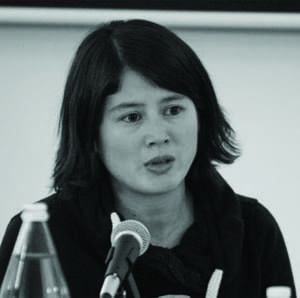 Nina Sparling, editorial intern at New Vessel Press, recently asked Milena Michiko Flašar, the author of I Called Him Necktie (translated by Sheila Dickie), a few questions about her impressive English-language debut novel. The book has received praise from a diverse range of voices, from O, The Oprah Magazine to Ruth Ozeki, to the Smithsonian’s book blog. Here’s what Flašar had to say.
Nina Sparling, editorial intern at New Vessel Press, recently asked Milena Michiko Flašar, the author of I Called Him Necktie (translated by Sheila Dickie), a few questions about her impressive English-language debut novel. The book has received praise from a diverse range of voices, from O, The Oprah Magazine to Ruth Ozeki, to the Smithsonian’s book blog. Here’s what Flašar had to say.
NVP: How did you find yourself writing a novel about a hikikomori as he begins to weave himself back into the world?
MMF: Characters who are turned inward on themselves have preoccupied me for a while and I have repeatedly written works in which these characters appear. There were countless openings and beginnings that I rejected, until I got to the point where I told myself: “No, stop, that’s not right. I haven’t yet found the story. I’d rather sleep on it for a night.” And then I’d already gone to bed, was already half asleep, when the phrase came to me: “I called him necktie,” precisely the title and the first sentence of the book, and then it was clear to me: The character who is turned inward on himself needs to have a second one at his side, namely this him, the necktie. And that was the starting point for writing a novel that was less about being a recluse and much more about emerging. A book about encountering and friendship.
NVP: The friendship between Hiro and the salaryman is stunning. They both face a sudden shift in routine and in that uncertainty open up to one another. Why did you choose to have Hiro befriend a salaryman, of all the people he might have encountered on a park bench?
MMF: The salaryman is not just an ordinary salaryman, but rather someone who having become unemployed has fallen out of the system and has created a bubble of illusion around himself. For this reason he seems to me a fraternal mirror image of the younger one; they are similar to each other and related to one another, they can simultaneously be teachers and students for one another.
NVP: I love the line in the opening, “I came here to try and work out whether the crack in the wall, that hairline fissure crossing above the bookshelves had any meaning internal or external.” In trying to work out the meaning of the crack, Hiro engages in a deep examination of the self. Through observation of the spaces and movement around him, Hiro discovers his own meaning and worth. What are some of the places and rooms that have been most formative in your life?
MMF: What shaped me most is definitely the space of my childhood. The “wilderness,” in which I moved around with my girl friends back then, out of our parents’ sight. Today I’m grateful for the great freedom I was allowed back then. Basically the space in which I grew up was a trust that was offered to me, and it protectively surrounds me even now.
 NVP: Networks, webs, and weaving return as themes throughout the book. His journey out is a slow unraveling of that web while he begins to build another based in human relationships. The friendships Hiro builds are so grounded in physical space, and seem to challenge or contrast with many of the virtual spaces that exist today. In reading the novel, it seems clear that the author has a deep sensitivity to the power and importance of people being in the same space together. Does the novel comment on the ultimate simplicity of our needs as people, relating to one another, in light of this?
NVP: Networks, webs, and weaving return as themes throughout the book. His journey out is a slow unraveling of that web while he begins to build another based in human relationships. The friendships Hiro builds are so grounded in physical space, and seem to challenge or contrast with many of the virtual spaces that exist today. In reading the novel, it seems clear that the author has a deep sensitivity to the power and importance of people being in the same space together. Does the novel comment on the ultimate simplicity of our needs as people, relating to one another, in light of this?
MMF: Yes, my novel is primarily about storytelling as a form of revelation and understanding, in which listening is given as much importance as the narrative itself. That becomes clear when one lends the other an ear, without judging what is said. A simple, at the same time attentive “Hmm,” that’s all it takes to give somebody the feeling that they share one and the same space, that both people have the right to be here just as they are.
NVP: I found the line in Necktie, “I had practiced forgetting how to speak for two years,” remarkable. Hiro has a powerful voice in this novel, and you render its development with a great attention to detail and sensitivity. How has teaching language influenced your writing, in terms of both style and subject?
MMF: By teaching a language one obtains a distance from it, one stands a bit to the side, only to find oneself back in the very middle with much greater awareness. I think that this far and near relationship has decisively influenced my writing.
NVP: What do you find most exciting about seeing your work in translation? What do you find most difficult?
MMF: It’s exciting to see how your own book broadens your range, as it goes on a journey, so to speak, and how as an author you travel with it, and you’re astonished where you end up. The hardest thing is certainly to let go, since on every journey there’s a departure from the familiar, which involves the greatest risk and at the same time the greatest relief.
NVP: The novel is divided up into short chapters – brief episodes and memories. The sentences are short and not a word is wasted. What connections do you see between this form and the narrative?
MMF: The characters speak their own language. Both Hiro, the hikikomori, and Tetsu, the salaryman conceal themselves, and their language mirrors this condition. Both have missed out on something decisive, both are prisoners of their conscience. The incompleteness and brevity of their sentences is the expression of what connects them internally. Their encounter marks also the beginning of an opening, an opening up to the other, to empathy and responsibility, that I wanted to make clear through the absence of quotation marks. In the end, it’s one person who speaks, one who expresses himself from his heart. Speech flows from one to the other, and in the end it (almost) doesn’t matter who’s actually speaking.
NVP: I was also interested in the question of how little is necessary to create a certain mood through language. How can something that seems simple and straightforward be described in all its depth.
MMF: I deliberately intended the brevity of the chapters (as in both of my previous books as well). I think of them as spoken images, as small images that gradually complete themselves in the mind of the reader.